ZhiWu Li
G-image Segmentation: Similarity-preserving Fuzzy C-Means with Spatial Information Constraint in Wavelet Space
Jul 01, 2020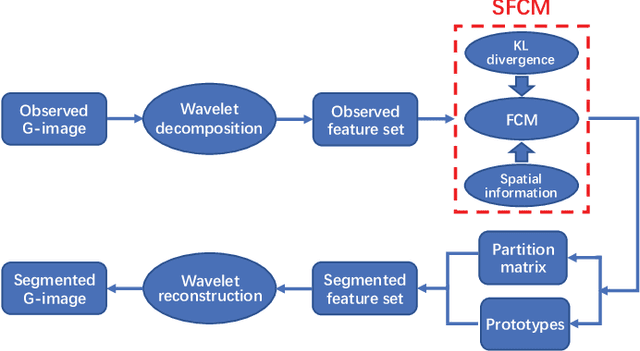
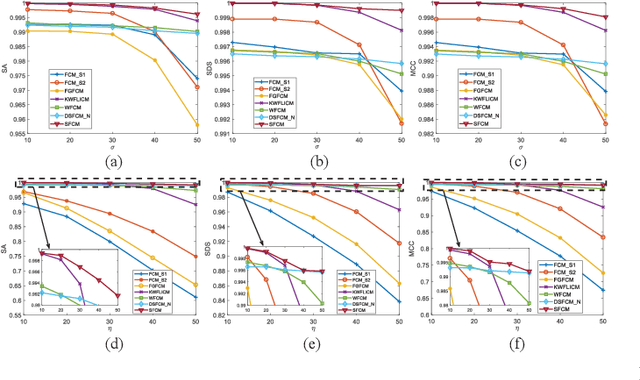
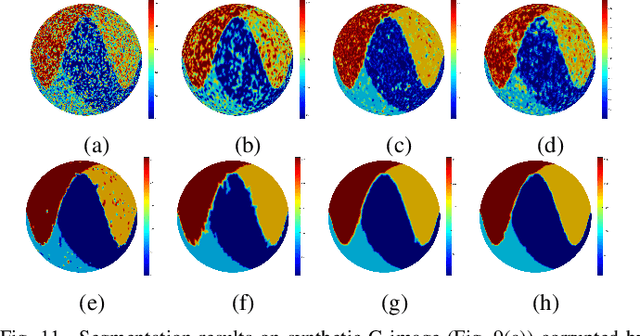
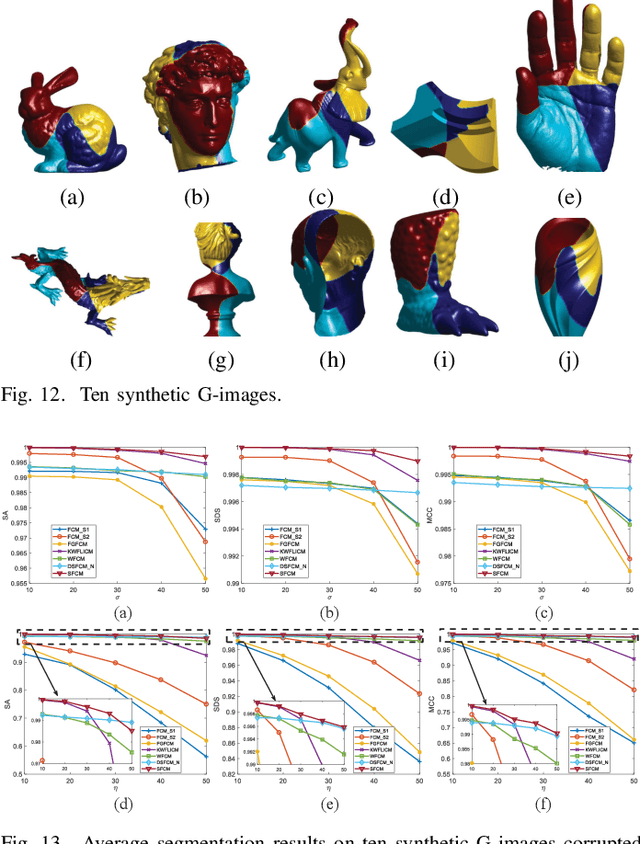
Abstract:G-images refer to image data defined on irregular graph domains. This work elaborates a similarity-preserving Fuzzy C-Means (FCM) algorithm for G-image segmentation and aims to develop techniques and tools for segmenting G-images. To preserve the membership similarity between an arbitrary image pixel and its neighbors, a Kullback-Leibler divergence term on membership partition is introduced as a part of FCM. As a result, similarity-preserving FCM is developed by considering spatial information of image pixels for its robustness enhancement. Due to superior characteristics of a wavelet space, the proposed FCM is performed in this space rather than Euclidean one used in conventional FCM to secure its high robustness. Experiments on synthetic and real-world G-images demonstrate that it indeed achieves higher robustness and performance than the state-of-the-art FCM algorithms. Moreover, it requires less computation than most of them.
Residual-driven Fuzzy C-Means Clustering for Image Segmentation
Apr 20, 2020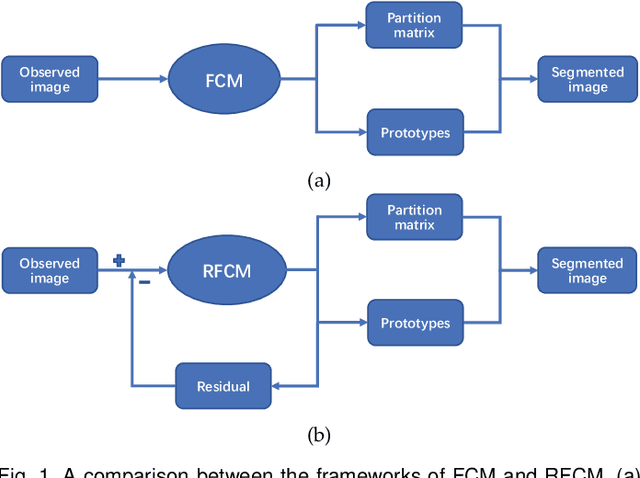

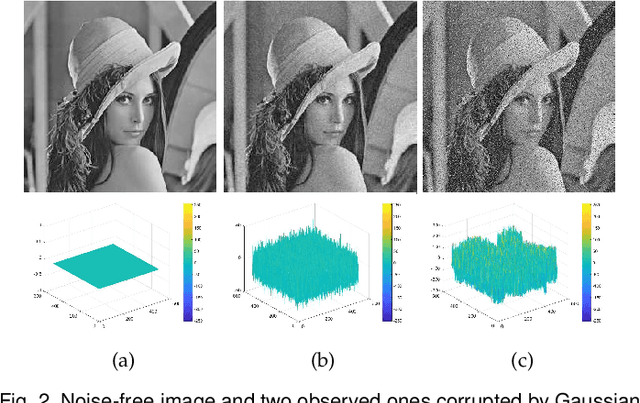

Abstract:Due to its inferior characteristics, an observed (noisy) image's direct use gives rise to poor segmentation results. Intuitively, using its noise-free image can favorably impact image segmentation. Hence, the accurate estimation of the residual between observed and noise-free images is an important task. To do so, we elaborate on residual-driven Fuzzy C-Means (FCM) for image segmentation, which is the first approach that realizes accurate residual estimation and leads noise-free image to participate in clustering. We propose a residual-driven FCM framework by integrating into FCM a residual-related fidelity term derived from the distribution of different types of noise. Built on this framework, we present a weighted $\ell_{2}$-norm fidelity term by weighting mixed noise distribution, thus resulting in a universal residual-driven FCM algorithm in presence of mixed or unknown noise. Besides, with the constraint of spatial information, the residual estimation becomes more reliable than that only considering an observed image itself. Supporting experiments on synthetic, medical, and real-world images are conducted. The results demonstrate the superior effectiveness and efficiency of the proposed algorithm over existing FCM-related algorithms.
Kullback-Leibler Divergence-Based Fuzzy $C$-Means Clustering Incorporating Morphological Reconstruction and Wavelet Frames for Image Segmentation
Feb 21, 2020
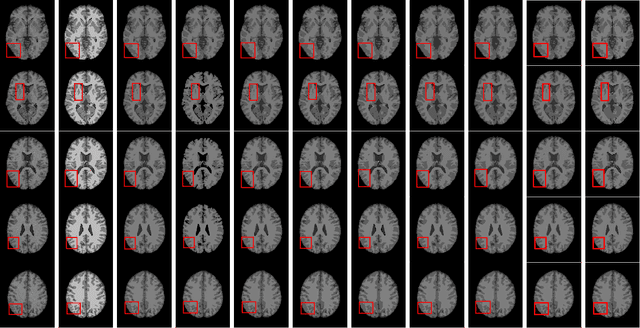
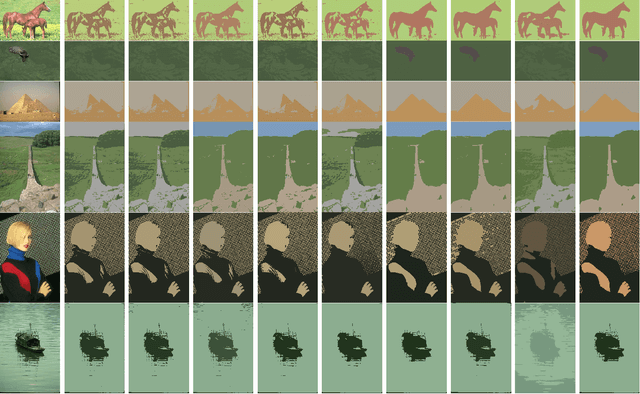

Abstract:Although spatial information of images usually enhance the robustness of the Fuzzy C-Means (FCM) algorithm, it greatly increases the computational costs for image segmentation. To achieve a sound trade-off between the segmentation performance and the speed of clustering, we come up with a Kullback-Leibler (KL) divergence-based FCM algorithm by incorporating a tight wavelet frame transform and a morphological reconstruction operation. To enhance FCM's robustness, an observed image is first filtered by using the morphological reconstruction. A tight wavelet frame system is employed to decompose the observed and filtered images so as to form their feature sets. Considering these feature sets as data of clustering, an modified FCM algorithm is proposed, which introduces a KL divergence term in the partition matrix into its objective function. The KL divergence term aims to make membership degrees of each image pixel closer to those of its neighbors, which brings that the membership partition becomes more suitable and the parameter setting of FCM becomes simplified. On the basis of the obtained partition matrix and prototypes, the segmented feature set is reconstructed by minimizing the inverse process of the modified objective function. To modify abnormal features produced in the reconstruction process, each reconstructed feature is reassigned to the closest prototype. As a result, the segmentation accuracy of KL divergence-based FCM is further improved. What's more, the segmented image is reconstructed by using a tight wavelet frame reconstruction operation. Finally, supporting experiments coping with synthetic, medical and color images are reported. Experimental results exhibit that the proposed algorithm works well and comes with better segmentation performance than other comparative algorithms. Moreover, the proposed algorithm requires less time than most of the FCM-related algorithms.
Residual-Sparse Fuzzy $C$-Means Clustering Incorporating Morphological Reconstruction and Wavelet frames
Feb 14, 2020



Abstract:Instead of directly utilizing an observed image including some outliers, noise or intensity inhomogeneity, the use of its ideal value (e.g. noise-free image) has a favorable impact on clustering. Hence, the accurate estimation of the residual (e.g. unknown noise) between the observed image and its ideal value is an important task. To do so, we propose an $\ell_0$ regularization-based Fuzzy $C$-Means (FCM) algorithm incorporating a morphological reconstruction operation and a tight wavelet frame transform. To achieve a sound trade-off between detail preservation and noise suppression, morphological reconstruction is used to filter an observed image. By combining the observed and filtered images, a weighted sum image is generated. Since a tight wavelet frame system has sparse representations of an image, it is employed to decompose the weighted sum image, thus forming its corresponding feature set. Taking it as data for clustering, we present an improved FCM algorithm by imposing an $\ell_0$ regularization term on the residual between the feature set and its ideal value, which implies that the favorable estimation of the residual is obtained and the ideal value participates in clustering. Spatial information is also introduced into clustering since it is naturally encountered in image segmentation. Furthermore, it makes the estimation of the residual more reliable. To further enhance the segmentation effects of the improved FCM algorithm, we also employ the morphological reconstruction to smoothen the labels generated by clustering. Finally, based on the prototypes and smoothed labels, the segmented image is reconstructed by using a tight wavelet frame reconstruction operation. Experimental results reported for synthetic, medical, and color images show that the proposed algorithm is effective and efficient, and outperforms other algorithms.
 Add to Chrome
Add to Chrome Add to Firefox
Add to Firefox Add to Edge
Add to Edge